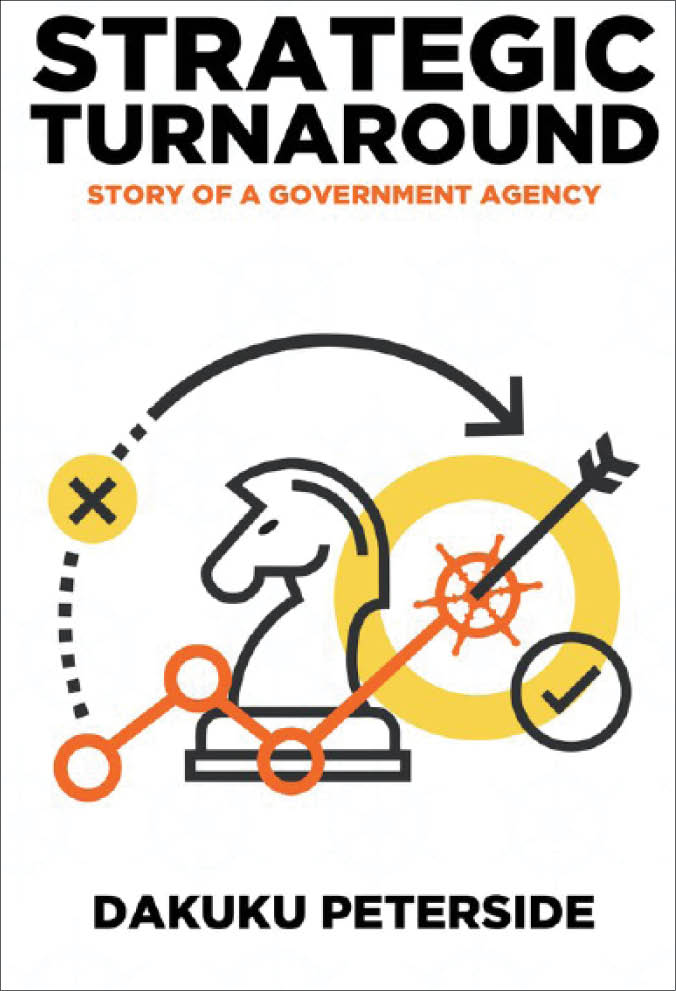Book: Strategic turnaround: Story of a government agency
Reviewer: Fergus Kell
Author: Dakuku Peterside
The threat of modern-day maritime piracy has become routinely associated with Africa more than with any other continent. Much of this notoriety can be traced back to the peak of the unprecedented crisis stemming from Somalia between 2008 and 2012, during which hundreds of attacks on ships were reported in the Gulf of Aden and western Indian Ocean, with several attracting multi-million-dollar ransoms.
Though the scale and scope of that crisis has not been surpassed in the past decade, the dubious accolade of leading global hotspot of piracy has increasingly shifted to the Gulf of Guinea, off the west African coast.
- Oil revenue: Nigeria’s economy about to collapse, ex-Emir Sanusi raises alarm
- Festivals can revamp Nigerian film industry, promote peace – Israel Audu
‘Between the devil and the deep blue sea’ by Colin Freeman and ‘Strategic turnaround: Story of a government agency’ by Dakuku Peterside are important contributions that highlight aspects of the topic that have been significantly overlooked amid this resurfacing of piracy in the international consciousness.
Freeman, who himself was kidnapped by pirates during his career as a foreign correspondent, brings both journalistic rigour and flair while recounting a series of personal ordeal faced by crew members of three vessels captured at the peak of Somali piracy, who were subsequently left stranded in captivity for years owing to the shipowners’ unwillingness or inability to pay the ransom demanded.
Their plight came to the attention of Colonel John Steed, a retired British Army officer who set about negotiating their release.
At its core, the book’s account of the forgotten hostages and Steed’s haphazard rescue efforts—despite a wider crisis that drew in ‘one of the largest peace-time Armadas the world has ever seen’ (p. 283)—is a compelling exposure of the uncomfortable reality that ‘piracy cases only attracted much attention if they were Westerners’ (p. 5).
While this point is hammered home by harrowing reports of the cruelty of the captors, there are glimpses here too of important underlying factors in the rise of piracy that may too often be disregarded by explanations based on pure greed or criminality. Freeman highlights onshore conditions of poverty and a lack of alternative opportunities, as well as piracy’s increasing sophistication and status as a business attracting rare local investment.
Peterside’s Strategic turnaround charts in painstaking detail the author’s tenure as director-general of the Nigerian Maritime Administration and Safety Agency (NIMASA) between 2016 and 2020. Taking over at a time when NIMASA was ‘plagued by reports of corruption, incompetence, lack of professionalism, inefficiency and so on’, and a time when numbers of reported incidents of armed robbery and piracy in the Gulf of Guinea were spiralling upwards, Peterside is credited with the transformation of the agency’s fortunes and its rise as an integral player in Nigeria’s maritime policy domain.
The book’s early chapters are devoted to an exhaustive mapping of the author’s personal involvement in internal agency shifts – ranging from human resources matters to the design of a new logo – which may be more likely to catch the eye of organizational management specialists than maritime security practitioners.
Its latter sections, however, open a valuable window on NIMASA’s efforts to push for legal reforms criminalizing piracy and to create a new Integrated National Security and Waterways Protection Infrastructure Project—‘Deep Blue’ for short.
This was a major initiative to enhance Nigeria’s domestic incident response capacity through equipment acquisition and deployment including patrol boats, armoured vessels and air support, a 24-hour command centre and training programmes.
At first glance, these two books may appear to present two sides of the same coin: one examining piracy’s human cost through accounts of its direct victims, the other a first-hand account of the policy efforts to address this insecurity. Yet, there are significant variations between the two cases and the regions to which they relate, providing a timely warning of the dangers of a one-size-fits-all approach to African maritime security issues.
Demands from the global shipping industry for a stronger international naval presence in the Gulf of Guinea have continued to mount in recent years, to mirror more closely the approach taken to suppress Somali piracy.
But whereas Freeman can ask of the decision to pay ransoms: ‘What was the alternative? In Somalia, there was no proper police force or navy’ (p. 141), Peterside’s narrative of Deep Blue indicates that such an alternative has been actively pursued by NIMASA and the Nigerian navy, despite the reservations repeatedly expressed by international partners. This apparent dismissal of domestic efforts feeds into a wider perception, shared by Peterside, that piracy statistics, industry statements and media reports are unfairly skewed against Nigeria—fuelling tensions that risk undermining the foundations for genuine maritime security cooperation between regional and international actors.
If one of these books exposes how the global furore around Somali piracy mostly ignored its non-western victims, the other should thus invite questions about whether the same disparity applies to regionally-led policy solutions. In this respect, the Deep Blue project, which was taken forward after Peterside’s departure and officially launched in June 2021, deserves greater recognition and support as a major step towards boosting Nigeria’s domestic response capabilities, even if a long road stretches ahead before its full implementation is achieved.
Both authors would likely acknowledge that enforcement responses or debates over ransom payments are only one part of a much larger picture, dominated by the need to tackle the complex socio-economic challenges facing coastal communities. Though the headlines may have shifted in recent years from Somali piracy to the Gulf of Guinea, neither region will be fully able to shake off the threat of piracy until these root causes are decisively addressed.
Fergus Kell is a University of Cambridge graduate and a Research Analyst at the African programme of Chatham House.

 Join Daily Trust WhatsApp Community For Quick Access To News and Happenings Around You.
Join Daily Trust WhatsApp Community For Quick Access To News and Happenings Around You.

